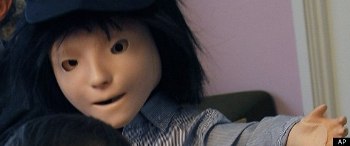Scientists at the University of Hertfordshire have developed a robot called Kaspar, which has been programmed to perform small actions like laughing, smiling, blinking, frowning and waving his arms at a cost of 1300 pounds or US$2118.
The robot has a baseball cap on his black shaggy hair and has some wires protruding from his neck. It wears striped red socks and is being used to develop and teach physical contact and emotions to autistic children.
 Kaspar-r-ROBOT-AUTISM
Kaspar-r-ROBOT-AUTISM
Eden Sawczenko, a four year old autistic girl who normally shunned contact with other little girls and turned stiff when touched, is much more ready to mingle with other girls and even hugs everyone after playing with Kaspar. According to Eden’s mother Claire Sawczenko, Eden is much more affectionate with her friends and is now even willing to hug others.
Eden is a preschool student in Stevenage, which is in North of London. Researchers bring in Kaspar once a week to the preschool, and the children are allowed to play with the robot under supervision. The children with autism ranging from severe to mild are allowed to play with Kasper for about 10 minutes. The robot is operated by a remote control by a scientist.
Many versions of Kaspar are available and researchers hope that the robot could be manufactured on a mass scale for a few hundred dollars. According to Ben Robins, a senior research fellow in the University and a specialist working with autistic children, children don’t understand facial expressions and hence don’t react to people. With robots they find it easy and safe as the robots are very predictable and easy to interpret.
Till date, about 300 children with autism in Britain have played with Kaspar robot. The new Kaspar model is covered with silicone patches to make the children feel more comfortable with touching people. The robot has a small repertoire of tricks such as laughing when his feet or sides are touched, stating his name, hiding his face with his hands and crying out when he is slapped, but this was plenty to entertain the autistic children.
An autism consultant, Nan Cannon-Jones stated that the robot allows the children to understand language and emotions by its actions. According to Dr. Abigael San, Clinical Psychologist for children in London and who is also the spokeswoman for the British Psychological Society, autistic children love things, which had many parts in them. However, they should not be allowed to depend on robots too much.
Kerstin Dautenhahn, one of the senior researchers for the Kaspar project, revealed that long-term comprehensive studies need to be carried out to see the impact of Kaspar on autistic children and probably the robot could prove beneficial to Down syndrome patients as well.